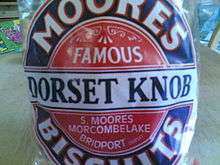Dorset knob

A Dorset knob is a hard dry savoury biscuit which is now produced by only a single producer, for a limited time of the year.
Dorset knobs are made from bread dough which contains extra sugar and butter. They are rolled and shaped by hand. They are baked three times. Once cooked, they are very crumbly and rather like very dry stale bread or rusks in consistency. [1]
They are named after their shape's resemblance to Dorset knob buttons,[1] but have also been compared, in size, to door knobs.[1]
Dorset knobs are typically eaten with cheese (for example, Dorset Blue Vinney).[2] Dorset knobs were said by his parlour maid to have been a favourite food of local author Thomas Hardy.[1] As they are so hard, they are also eaten by first soaking them in sweet tea.[3]
In the past there were a number of producers of Dorset knobs. Today the only firm to produce them commercially is Moores Biscuits of Morcombelake four miles west of Bridport in the west of the county of Dorset in England.[2] The Moore family have baked biscuits in Dorset since before 1860. The bakery was established in 1880 by Samuel Moore and manufactures a variety of traditional biscuits in addition to the Dorset knob. Dorset knobs are only produced during the months of January and February.[1] They are normally sold in a distinctive and traditional tin.
A Dorset knob throwing competition is held in the Dorset village of Cattistock every year on the first Sunday in May.[4] The festival also includes such events as a knob and spoon race, knob darts, knob painting and guess the weight of the knob.[2] The record throw of 29.4 metres (96 ft) was set in 2012.[5]
References
- 1 2 3 4 5 Adam Edwards (23 February 2002). "Le knob est arrivé". Daily Telegraph. Retrieved 8 April 2011.
- 1 2 3 "Throwing a Dorset knob". BBC News Online. May 2009. Retrieved 8 April 2011.
- ↑ "Knob Varieties".
- ↑ "Records set in biscuit throw show". BBC News Online. 2009-05-05. Retrieved 2010-01-31.
- ↑ "Dorset knob throwing contest attracts thousands". BBC News Online. 4 May 2014.
